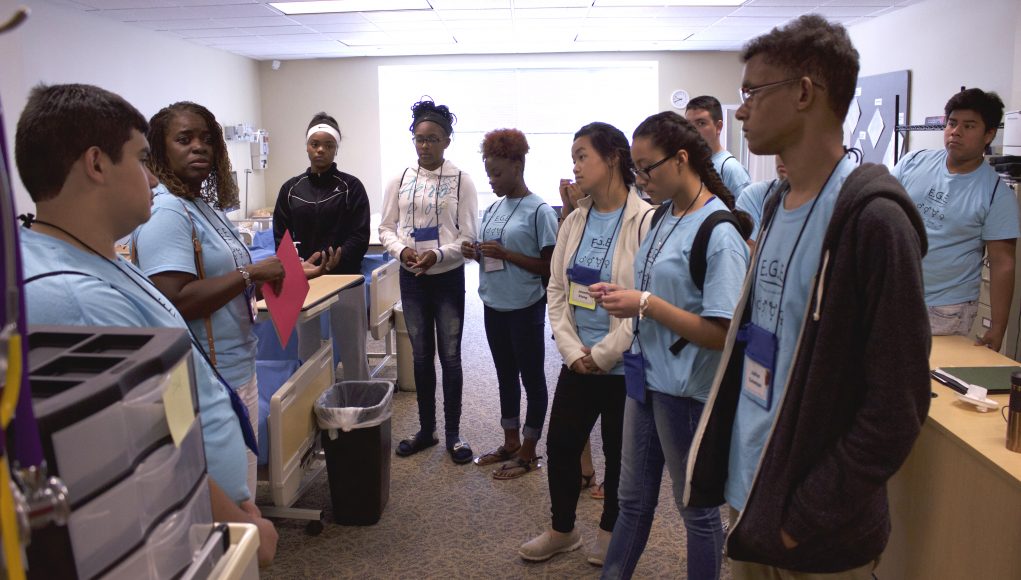Room 222 of Madison College mirrored the Shark Tank sound stage at ABC Studios on Aug. 26. Four groups of eager teens stood, steadfast, at the front of the classroom as they each pitched their innovative ideas for social entrepreneurship. Ventures ranged from “Cookies for Change” which would use proceeds to finance healthy eating programs for homeless women and children to “Nuestra Comunidad,” a group that harnesses the skills of artisans to fund projects that support immigration rights at a local community center.
Each group outlined a business model to a panel of local entrepreneurs. This panel would decide which group’s idea would make it out of the tank and come to life. Students were grilled about their sustainability plans, the economic viability of their concepts, and were asked to consider how their business models would affect intersecting communities. After nearly 90 minutes of intense advocacy and deliberation, the panel chose “Embracing Gender Equality” as the initiative students would rally behind. The entire class would spend the next two weeks developing a business that not only should turn a profit but spread awareness about women’s rights and gender inequality.
Pitch day was only the beginning of the second week of “These Teens Mean Busines$,” a four-week course that teaches high school students the principles of social entrepreneurship. Students learn how to create a business plan, conduct market research, develop an advertising strategy, procure supplies, sell their product, and track business finances. Dr. Roxie Hentz is the founder of CEOs of Tomorrow and facilitator of the “These Teens Mean Busines$” course. Dr. Hentz, a career educator, developed the curriculum to expose students to business and social justice early on and infuse those principles with what they learn in a traditional classroom.

“I have witnessed first-hand the significant outcomes as a result of exposing youth to this kind of real-world and purposeful learning,” Dr. Hentz told Madison 365. “Beyond the obvious academic benefits, kids also get to develop and practice leadership, optimism, grit, resilience, creativity, empathy, and emotional and social intelligence – all necessary and critical life skills.”
Students are already beginning to see the benefit of these intersections. Jaydy Camacho, a freshman at James Madison Memorial High School credits “These Teens Mean Busines$” for making her more comfortable taking risks.
“I know [starting a business] is not going to be easy, but as Dr. Hentz says, ‘It’s not going to be a straight path, there will be bumps along the way. It’s going to be a journey,’” Camacho tells Madison 365. The course also enabled Camacho to meet other students from around Dane County with similar passions. “I’ve learned how to start my own business and get along with people,” she says. “Dr. Hentz got us to open up to each other.”
The class also helped young social entrepreneurs, like Julius Coleman, fortify their skills. Coleman is a senior at Abundant Life High School. Before starting “These Teens Mean Busines$” he designed a workshop for senior citizens to teach them social media skills. “[The workshop] started as me just wanting to give back to the community. I thought ‘what is something that no one does?’” Coleman enrolled in “These Teens Mean Busines$” and believes the class was valuable in developing his emerging social entrepreneurship enterprise. “There is not a class that you can take a school that tells you how to start your own business,” Coleman says. “I had ideas about making a business, but I was not exactly sure how to do it. This class really teaches you what you need to know.”

In addition to teaching students foundational business skills, “These Teens Mean Busines$” offers college credit for successful completion of the course. Students had the opportunity to visit Cardinal Stritch University, where they participated in a graduation ceremony with campus administrators and student leaders. Particularly impressive, many of the students in the program are freshman and sophomores. Dr. Hentz believes allowing underclassman to participate in the program allows them to see college as a more immediate goal.
“For freshmen and sophomore students, course completion has resulted in them immediately crowning themselves as scholars with a more tangible outlook on college as not a distance thought, but a present and personal reality,” Dr. Hentz says. “The students enter the school year after the summer cloaked in confidence and driven for success. More than the credits for these younger students, it also earns them a passport to enhanced college opportunities.”
Joanne Brown is impressed by the changes she’s seen in her daughter, Daiysha, as she prepares to enter high school. “This class really helped Daiysha experience the rigor of high school,” Brown says. “She’s learned how to work in teams and communicate with others. I’ve seen a boost in confidence, and I hope that continues as she transitions to high school.”
For more information about the “These Teens Mean Busines$” course and CEOs of Tomorrow, visit their website.




























